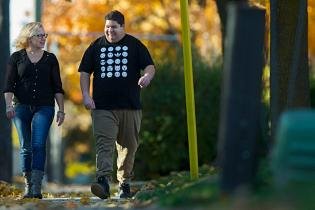Changes to Child Support law up to Queen’s Park, Not courts, Lawyer Argues
The father at the centre of a constitutional challenge of Ontario’s child support law says he is “stunned†by the attention the case has received.
“This is bigger than me,†said Wayne Watson outside Brampton Court Friday, where seven lawyers acting pro bono gathered to argue whether the law discriminates against adult children with disabilities.
‎“This is for the government to look at,†said Watson, who has paid child support for Joshua, his estranged 22-year-old developmentally disabled son, since the boy was 4 and now wants to stop paying.
“This is not my fight. I’m caught in the middle,†he said.
Lawyers acting as “friends of the court†on behalf of Watson said it should be up to Queen’s Park — and not a judge — to decide if child support for disabled children of unmarried parents should continue into adulthood.
“Laws are to be m‎ade by our elected officials,†lawyer Gary Joseph told Ontario Court Justice William Sullivan. “If there is a problem with the law . . . it should be subjected to the consideration of our provincial legislature with full debate and all of the stakeholders being able to have a say.â€
Under Ontario’s Family Law Act, which governs unmarried parents, adult children are eligible for child support only if they are in school full-time.
But under the federal Divorce Act, an adult child who is unable to live independently due to disability, illness or other cause is eligible for support.
As a result, Robyn Coates, the single mother who has raised Watson’s disabled son, launched the Charter challenge of Ontario’s law, claiming it discriminates against the disabled children of unmarried parents.
Coates, an educational resource worker for students with special needs in the Dufferin-Peel Catholic School Board, says she needs child support to help defray the costs of day programs and medical expenses for Joshua that can run as high as $1,400 a month.
Watson said he recognizes that Joshua is disabled, but he noted programs such as the Ontario Disability Support Program are there to help.
“I’m in a bind too,†he said in an interview. “I have two other kids who I’m trying to do my best with. This is also causing a burden on me too.â€
Coates’s lawyer Robert Shawyer noted that these children are eligible for support in every province except Ontario and Alberta and urged Justice Sullivan to “bring Ontario law into line with all other provinces.â€
“Joshua is being discriminated against because of his parents’ marital status,†he told the court. “It is not fair to treat one set of children based on federal law and another set of children . . . based on provincial law.
Although Justice Sullivan does not have the jurisdiction to change the law, he can decide not to apply it in this case because it violates the Charter, Shawyer told the court.
By extending child support to Joshua, Sullivan’s decision would set a precedent that could help other parents and “send a message to the government that we can’t do this. We need to change the law,†he added.
If the case succeeds, thousands of single parents and their adult children as well as LGBTQ parents and their children could also claim child support in Ontario, added lawyer Joanna Radbord, an intervener in the case representing Family Alliance Ontario, an organization that supports individuals with disabilities and their families
Since same-sex marriage was not legal in Canada until 2003, disabled young adult children of LGBTQ parents also face discrimination under Ontario child support laws, said Radbord, who is also acting on behalf of the Sherbourne Health Clinic, which supports LGBTQ parents and children.
“If the legislature isn’t going to protect vulnerable minorities, it’s up to the court to apply the law — the supreme law of Canada, which is the Charter — to protect vulnerable minorities,†she said in an interview outside court.
Although the provincial attorney general’s office declined the court’s invitation to intervene in the case, “we are aware of the case and are monitoring it closely,†said ministry spokeswoman Emilie Smith.
“The Ministry of the Attorney General is always willing to consider proposals for reforms to Ontario’s family laws,†she added.
Justice Sullivan reserved his decision.
Read More..
Comments
There are 0 comments on this post





